Detailed Case Study: ASIC v Sino Australia Oil & Gas Ltd & Corp Law
VerifiedAdded on 2023/04/24
|10
|2733
|411
Case Study
AI Summary
This case study delves into the Australian Securities and Investment Commission v Sino Australia Oil and Gas Limited case, focusing on the breach of director's duties under the Corporation Act 2001. The case highlights how Sino Australia Oil and Gas Limited breached several provisions of the Act, leading to penalties and the suspension of a director. The director was found to have encouraged the company to engage in deceptive and misleading conduct, including misstatements in the prospectus and failure to disclose critical information. The court determined that the director failed to exercise due diligence and care, as required by section 180(1) of the Corporation Act, and rejected the director's defense of lacking proficiency in English and relying on others' decisions. The analysis covers the specific duties breached, the court's decision, and the implications for the development of corporation law in Australia, emphasizing the importance of directors' understanding and adherence to legal requirements.
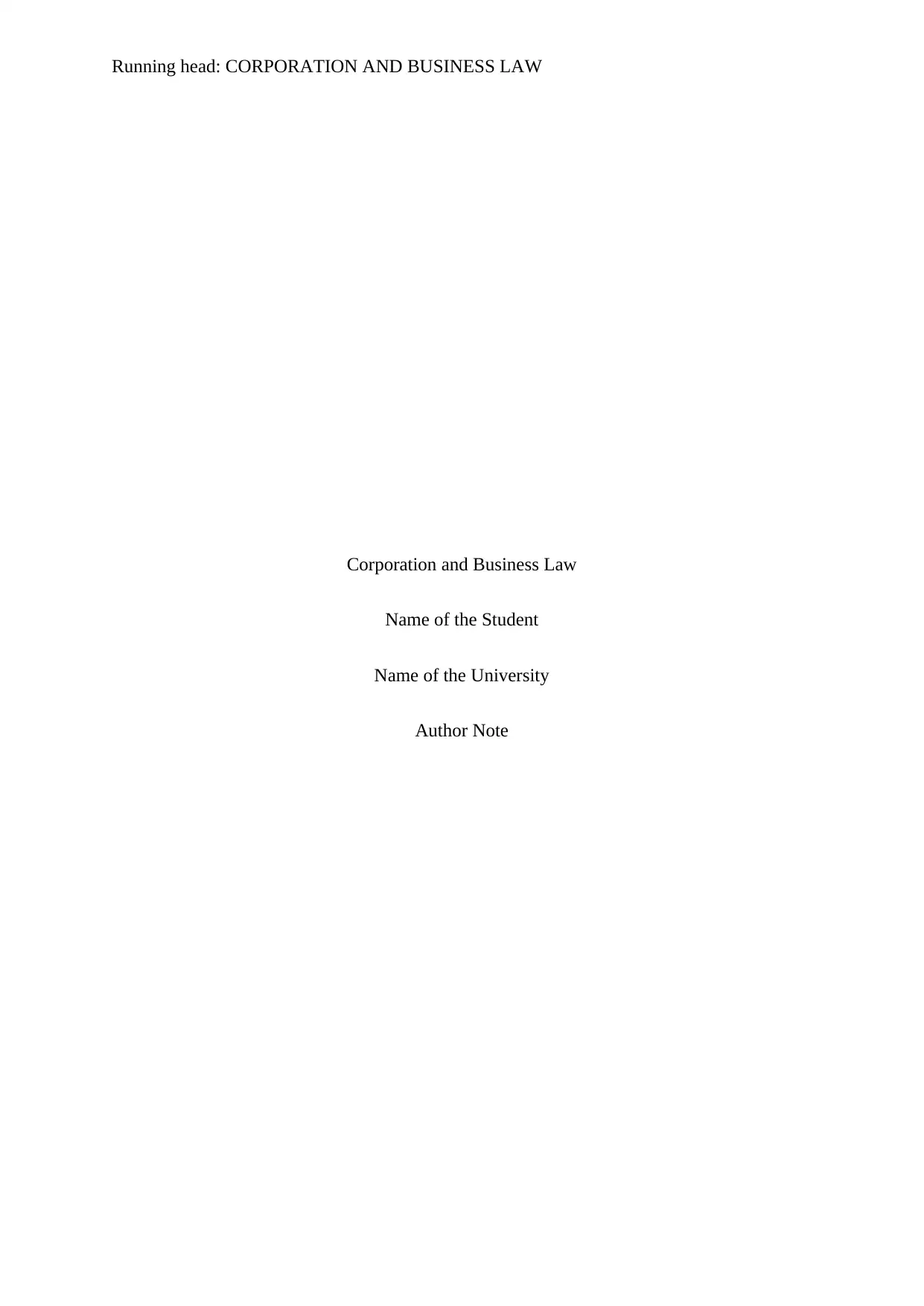
Running head: CORPORATION AND BUSINESS LAW
Corporation and Business Law
Name of the Student
Name of the University
Author Note
Corporation and Business Law
Name of the Student
Name of the University
Author Note
Paraphrase This Document
Need a fresh take? Get an instant paraphrase of this document with our AI Paraphraser
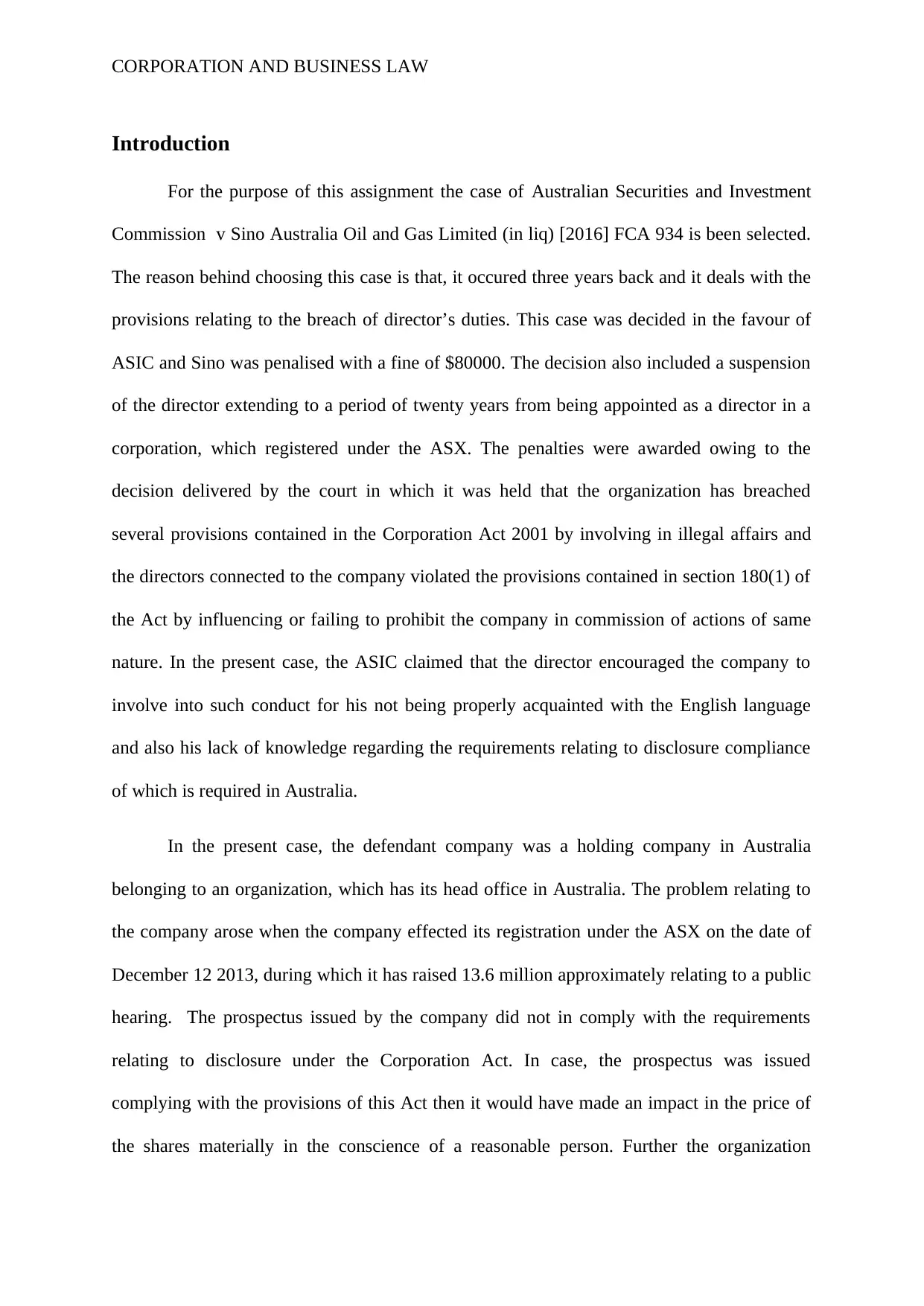
CORPORATION AND BUSINESS LAW
Introduction
For the purpose of this assignment the case of Australian Securities and Investment
Commission v Sino Australia Oil and Gas Limited (in liq) [2016] FCA 934 is been selected.
The reason behind choosing this case is that, it occured three years back and it deals with the
provisions relating to the breach of director’s duties. This case was decided in the favour of
ASIC and Sino was penalised with a fine of $80000. The decision also included a suspension
of the director extending to a period of twenty years from being appointed as a director in a
corporation, which registered under the ASX. The penalties were awarded owing to the
decision delivered by the court in which it was held that the organization has breached
several provisions contained in the Corporation Act 2001 by involving in illegal affairs and
the directors connected to the company violated the provisions contained in section 180(1) of
the Act by influencing or failing to prohibit the company in commission of actions of same
nature. In the present case, the ASIC claimed that the director encouraged the company to
involve into such conduct for his not being properly acquainted with the English language
and also his lack of knowledge regarding the requirements relating to disclosure compliance
of which is required in Australia.
In the present case, the defendant company was a holding company in Australia
belonging to an organization, which has its head office in Australia. The problem relating to
the company arose when the company effected its registration under the ASX on the date of
December 12 2013, during which it has raised 13.6 million approximately relating to a public
hearing. The prospectus issued by the company did not in comply with the requirements
relating to disclosure under the Corporation Act. In case, the prospectus was issued
complying with the provisions of this Act then it would have made an impact in the price of
the shares materially in the conscience of a reasonable person. Further the organization
Introduction
For the purpose of this assignment the case of Australian Securities and Investment
Commission v Sino Australia Oil and Gas Limited (in liq) [2016] FCA 934 is been selected.
The reason behind choosing this case is that, it occured three years back and it deals with the
provisions relating to the breach of director’s duties. This case was decided in the favour of
ASIC and Sino was penalised with a fine of $80000. The decision also included a suspension
of the director extending to a period of twenty years from being appointed as a director in a
corporation, which registered under the ASX. The penalties were awarded owing to the
decision delivered by the court in which it was held that the organization has breached
several provisions contained in the Corporation Act 2001 by involving in illegal affairs and
the directors connected to the company violated the provisions contained in section 180(1) of
the Act by influencing or failing to prohibit the company in commission of actions of same
nature. In the present case, the ASIC claimed that the director encouraged the company to
involve into such conduct for his not being properly acquainted with the English language
and also his lack of knowledge regarding the requirements relating to disclosure compliance
of which is required in Australia.
In the present case, the defendant company was a holding company in Australia
belonging to an organization, which has its head office in Australia. The problem relating to
the company arose when the company effected its registration under the ASX on the date of
December 12 2013, during which it has raised 13.6 million approximately relating to a public
hearing. The prospectus issued by the company did not in comply with the requirements
relating to disclosure under the Corporation Act. In case, the prospectus was issued
complying with the provisions of this Act then it would have made an impact in the price of
the shares materially in the conscience of a reasonable person. Further the organization
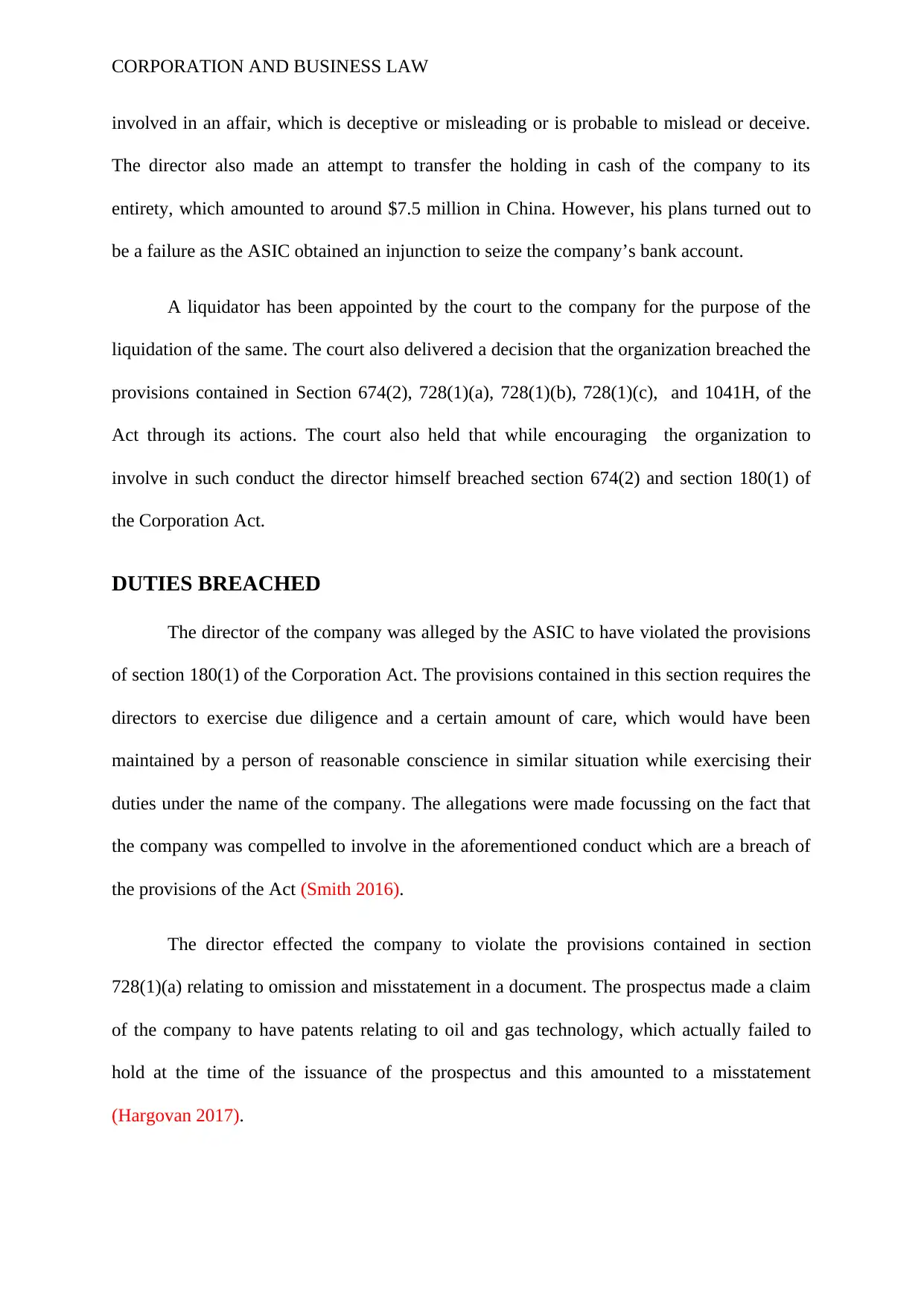
CORPORATION AND BUSINESS LAW
involved in an affair, which is deceptive or misleading or is probable to mislead or deceive.
The director also made an attempt to transfer the holding in cash of the company to its
entirety, which amounted to around $7.5 million in China. However, his plans turned out to
be a failure as the ASIC obtained an injunction to seize the company’s bank account.
A liquidator has been appointed by the court to the company for the purpose of the
liquidation of the same. The court also delivered a decision that the organization breached the
provisions contained in Section 674(2), 728(1)(a), 728(1)(b), 728(1)(c), and 1041H, of the
Act through its actions. The court also held that while encouraging the organization to
involve in such conduct the director himself breached section 674(2) and section 180(1) of
the Corporation Act.
DUTIES BREACHED
The director of the company was alleged by the ASIC to have violated the provisions
of section 180(1) of the Corporation Act. The provisions contained in this section requires the
directors to exercise due diligence and a certain amount of care, which would have been
maintained by a person of reasonable conscience in similar situation while exercising their
duties under the name of the company. The allegations were made focussing on the fact that
the company was compelled to involve in the aforementioned conduct which are a breach of
the provisions of the Act (Smith 2016).
The director effected the company to violate the provisions contained in section
728(1)(a) relating to omission and misstatement in a document. The prospectus made a claim
of the company to have patents relating to oil and gas technology, which actually failed to
hold at the time of the issuance of the prospectus and this amounted to a misstatement
(Hargovan 2017).
involved in an affair, which is deceptive or misleading or is probable to mislead or deceive.
The director also made an attempt to transfer the holding in cash of the company to its
entirety, which amounted to around $7.5 million in China. However, his plans turned out to
be a failure as the ASIC obtained an injunction to seize the company’s bank account.
A liquidator has been appointed by the court to the company for the purpose of the
liquidation of the same. The court also delivered a decision that the organization breached the
provisions contained in Section 674(2), 728(1)(a), 728(1)(b), 728(1)(c), and 1041H, of the
Act through its actions. The court also held that while encouraging the organization to
involve in such conduct the director himself breached section 674(2) and section 180(1) of
the Corporation Act.
DUTIES BREACHED
The director of the company was alleged by the ASIC to have violated the provisions
of section 180(1) of the Corporation Act. The provisions contained in this section requires the
directors to exercise due diligence and a certain amount of care, which would have been
maintained by a person of reasonable conscience in similar situation while exercising their
duties under the name of the company. The allegations were made focussing on the fact that
the company was compelled to involve in the aforementioned conduct which are a breach of
the provisions of the Act (Smith 2016).
The director effected the company to violate the provisions contained in section
728(1)(a) relating to omission and misstatement in a document. The prospectus made a claim
of the company to have patents relating to oil and gas technology, which actually failed to
hold at the time of the issuance of the prospectus and this amounted to a misstatement
(Hargovan 2017).
⊘ This is a preview!⊘
Do you want full access?
Subscribe today to unlock all pages.

Trusted by 1+ million students worldwide
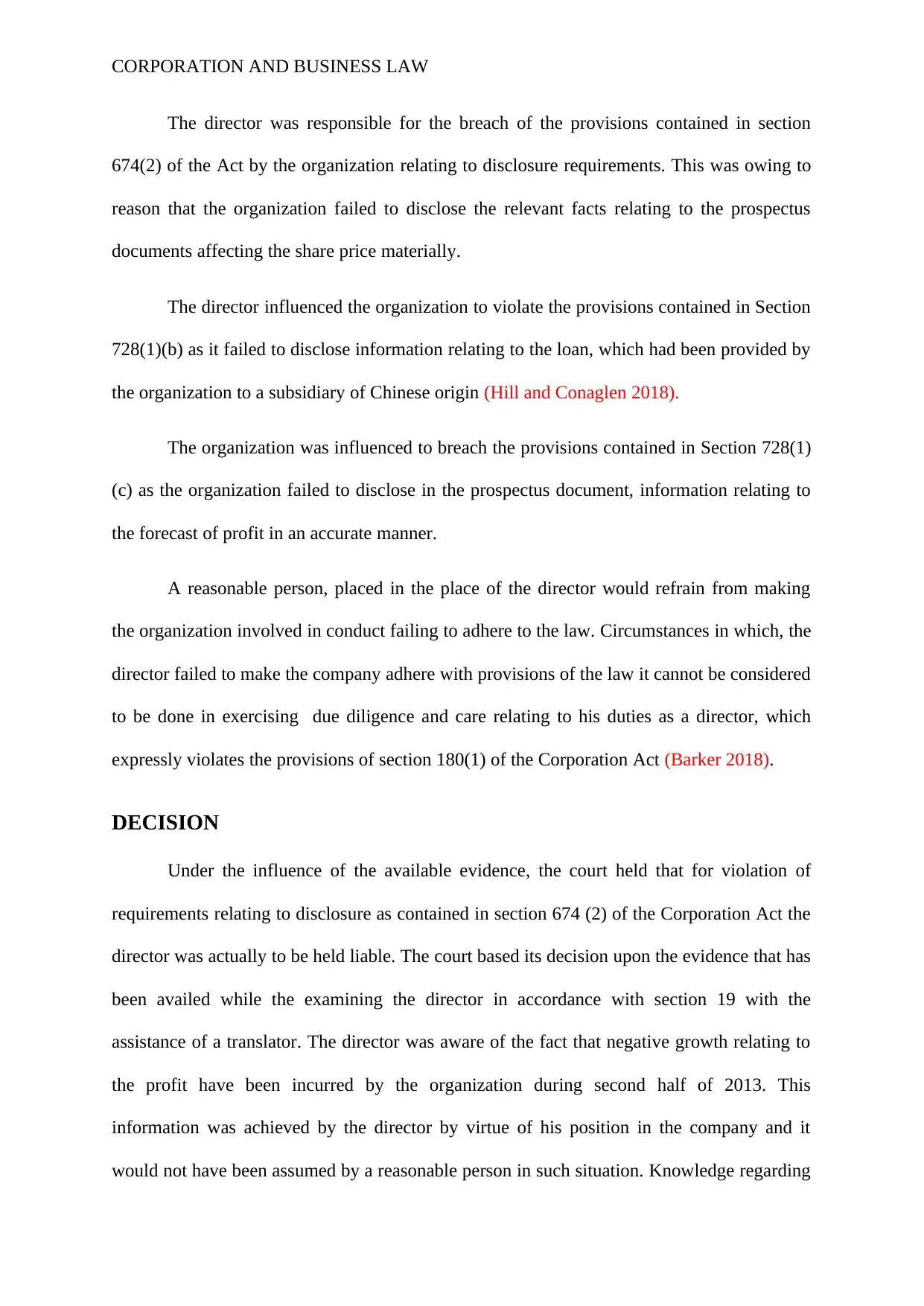
CORPORATION AND BUSINESS LAW
The director was responsible for the breach of the provisions contained in section
674(2) of the Act by the organization relating to disclosure requirements. This was owing to
reason that the organization failed to disclose the relevant facts relating to the prospectus
documents affecting the share price materially.
The director influenced the organization to violate the provisions contained in Section
728(1)(b) as it failed to disclose information relating to the loan, which had been provided by
the organization to a subsidiary of Chinese origin (Hill and Conaglen 2018).
The organization was influenced to breach the provisions contained in Section 728(1)
(c) as the organization failed to disclose in the prospectus document, information relating to
the forecast of profit in an accurate manner.
A reasonable person, placed in the place of the director would refrain from making
the organization involved in conduct failing to adhere to the law. Circumstances in which, the
director failed to make the company adhere with provisions of the law it cannot be considered
to be done in exercising due diligence and care relating to his duties as a director, which
expressly violates the provisions of section 180(1) of the Corporation Act (Barker 2018).
DECISION
Under the influence of the available evidence, the court held that for violation of
requirements relating to disclosure as contained in section 674 (2) of the Corporation Act the
director was actually to be held liable. The court based its decision upon the evidence that has
been availed while the examining the director in accordance with section 19 with the
assistance of a translator. The director was aware of the fact that negative growth relating to
the profit have been incurred by the organization during second half of 2013. This
information was achieved by the director by virtue of his position in the company and it
would not have been assumed by a reasonable person in such situation. Knowledge regarding
The director was responsible for the breach of the provisions contained in section
674(2) of the Act by the organization relating to disclosure requirements. This was owing to
reason that the organization failed to disclose the relevant facts relating to the prospectus
documents affecting the share price materially.
The director influenced the organization to violate the provisions contained in Section
728(1)(b) as it failed to disclose information relating to the loan, which had been provided by
the organization to a subsidiary of Chinese origin (Hill and Conaglen 2018).
The organization was influenced to breach the provisions contained in Section 728(1)
(c) as the organization failed to disclose in the prospectus document, information relating to
the forecast of profit in an accurate manner.
A reasonable person, placed in the place of the director would refrain from making
the organization involved in conduct failing to adhere to the law. Circumstances in which, the
director failed to make the company adhere with provisions of the law it cannot be considered
to be done in exercising due diligence and care relating to his duties as a director, which
expressly violates the provisions of section 180(1) of the Corporation Act (Barker 2018).
DECISION
Under the influence of the available evidence, the court held that for violation of
requirements relating to disclosure as contained in section 674 (2) of the Corporation Act the
director was actually to be held liable. The court based its decision upon the evidence that has
been availed while the examining the director in accordance with section 19 with the
assistance of a translator. The director was aware of the fact that negative growth relating to
the profit have been incurred by the organization during second half of 2013. This
information was achieved by the director by virtue of his position in the company and it
would not have been assumed by a reasonable person in such situation. Knowledge regarding
Paraphrase This Document
Need a fresh take? Get an instant paraphrase of this document with our AI Paraphraser
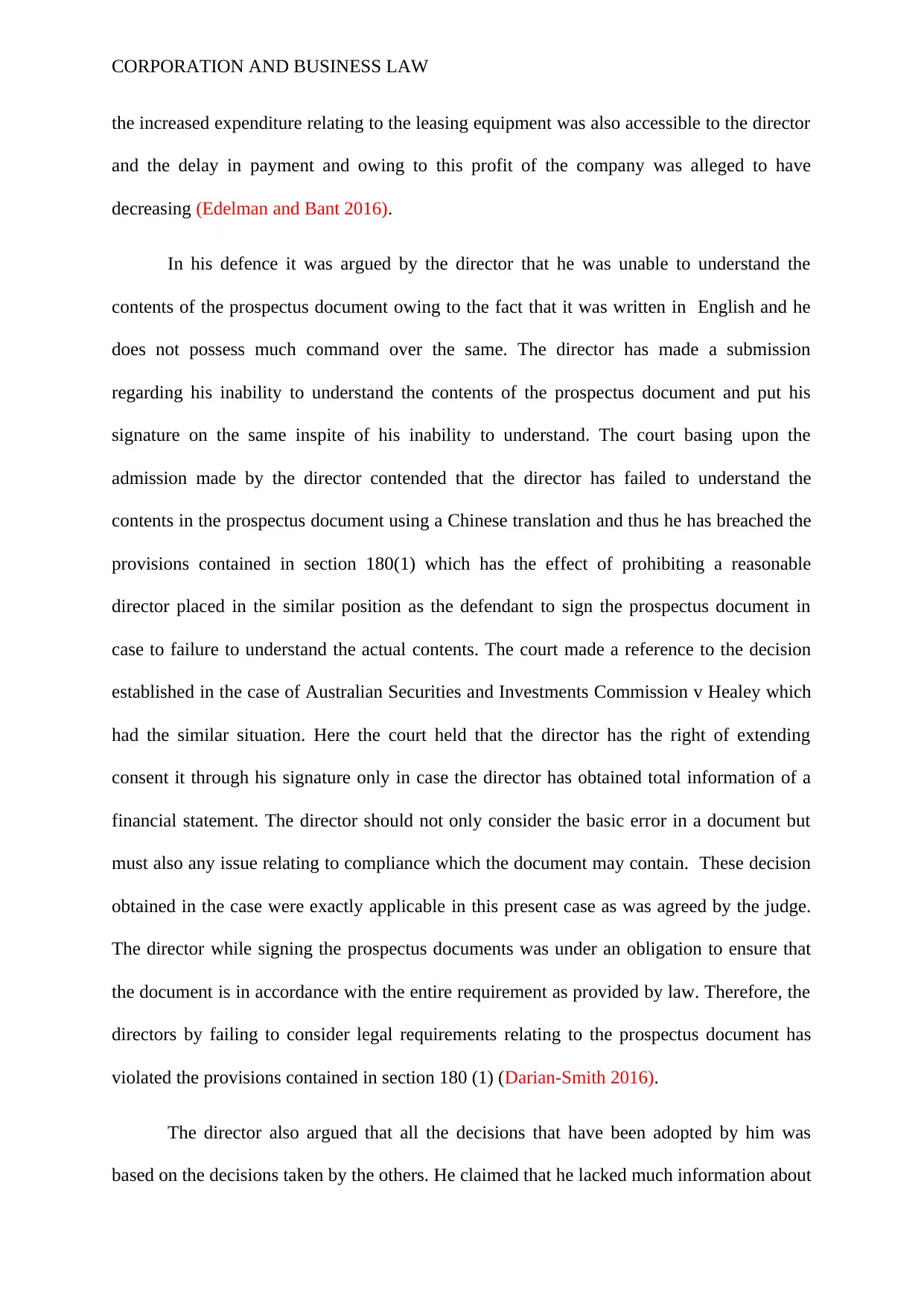
CORPORATION AND BUSINESS LAW
the increased expenditure relating to the leasing equipment was also accessible to the director
and the delay in payment and owing to this profit of the company was alleged to have
decreasing (Edelman and Bant 2016).
In his defence it was argued by the director that he was unable to understand the
contents of the prospectus document owing to the fact that it was written in English and he
does not possess much command over the same. The director has made a submission
regarding his inability to understand the contents of the prospectus document and put his
signature on the same inspite of his inability to understand. The court basing upon the
admission made by the director contended that the director has failed to understand the
contents in the prospectus document using a Chinese translation and thus he has breached the
provisions contained in section 180(1) which has the effect of prohibiting a reasonable
director placed in the similar position as the defendant to sign the prospectus document in
case to failure to understand the actual contents. The court made a reference to the decision
established in the case of Australian Securities and Investments Commission v Healey which
had the similar situation. Here the court held that the director has the right of extending
consent it through his signature only in case the director has obtained total information of a
financial statement. The director should not only consider the basic error in a document but
must also any issue relating to compliance which the document may contain. These decision
obtained in the case were exactly applicable in this present case as was agreed by the judge.
The director while signing the prospectus documents was under an obligation to ensure that
the document is in accordance with the entire requirement as provided by law. Therefore, the
directors by failing to consider legal requirements relating to the prospectus document has
violated the provisions contained in section 180 (1) (Darian-Smith 2016).
The director also argued that all the decisions that have been adopted by him was
based on the decisions taken by the others. He claimed that he lacked much information about
the increased expenditure relating to the leasing equipment was also accessible to the director
and the delay in payment and owing to this profit of the company was alleged to have
decreasing (Edelman and Bant 2016).
In his defence it was argued by the director that he was unable to understand the
contents of the prospectus document owing to the fact that it was written in English and he
does not possess much command over the same. The director has made a submission
regarding his inability to understand the contents of the prospectus document and put his
signature on the same inspite of his inability to understand. The court basing upon the
admission made by the director contended that the director has failed to understand the
contents in the prospectus document using a Chinese translation and thus he has breached the
provisions contained in section 180(1) which has the effect of prohibiting a reasonable
director placed in the similar position as the defendant to sign the prospectus document in
case to failure to understand the actual contents. The court made a reference to the decision
established in the case of Australian Securities and Investments Commission v Healey which
had the similar situation. Here the court held that the director has the right of extending
consent it through his signature only in case the director has obtained total information of a
financial statement. The director should not only consider the basic error in a document but
must also any issue relating to compliance which the document may contain. These decision
obtained in the case were exactly applicable in this present case as was agreed by the judge.
The director while signing the prospectus documents was under an obligation to ensure that
the document is in accordance with the entire requirement as provided by law. Therefore, the
directors by failing to consider legal requirements relating to the prospectus document has
violated the provisions contained in section 180 (1) (Darian-Smith 2016).
The director also argued that all the decisions that have been adopted by him was
based on the decisions taken by the others. He claimed that he lacked much information about
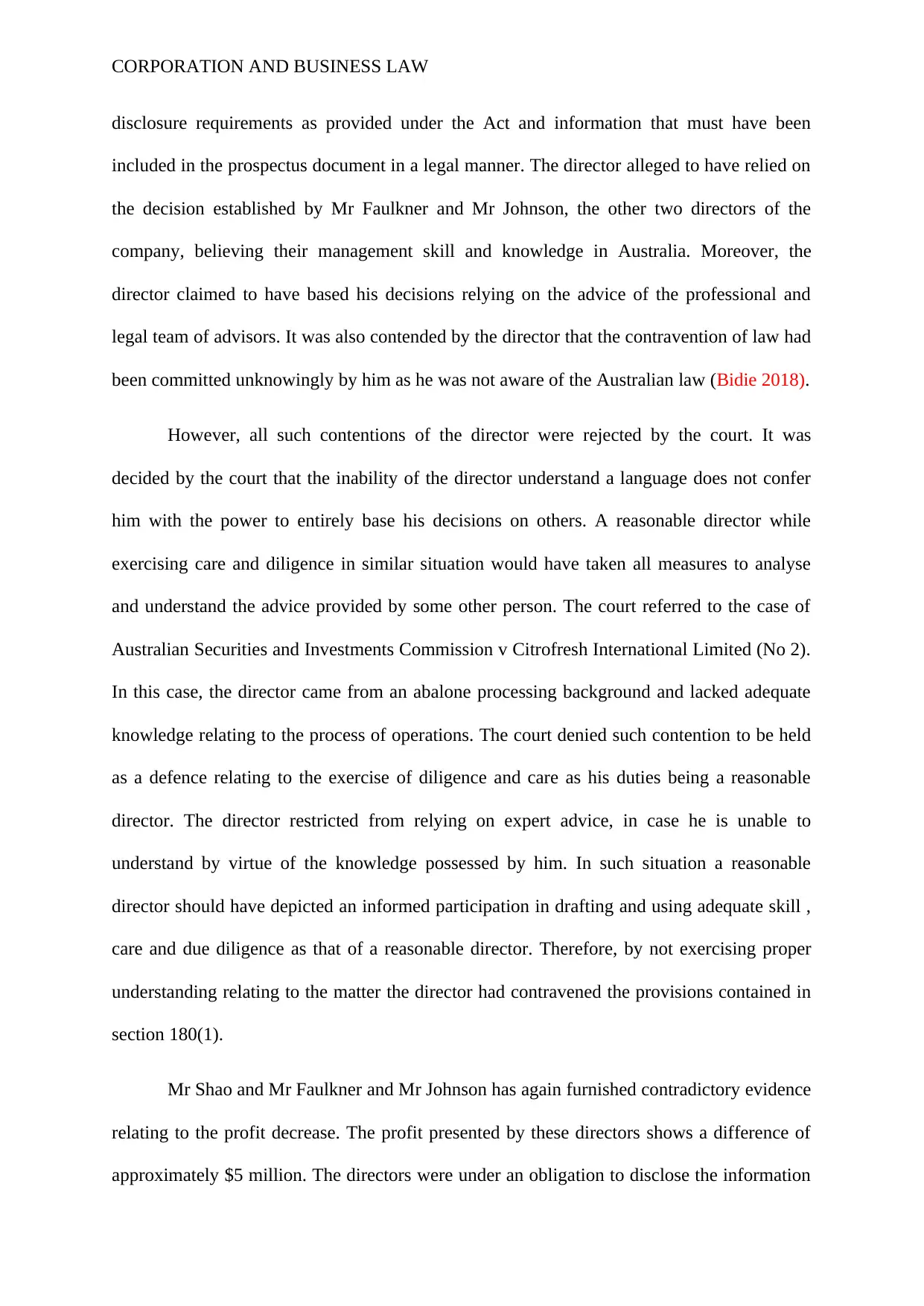
CORPORATION AND BUSINESS LAW
disclosure requirements as provided under the Act and information that must have been
included in the prospectus document in a legal manner. The director alleged to have relied on
the decision established by Mr Faulkner and Mr Johnson, the other two directors of the
company, believing their management skill and knowledge in Australia. Moreover, the
director claimed to have based his decisions relying on the advice of the professional and
legal team of advisors. It was also contended by the director that the contravention of law had
been committed unknowingly by him as he was not aware of the Australian law (Bidie 2018).
However, all such contentions of the director were rejected by the court. It was
decided by the court that the inability of the director understand a language does not confer
him with the power to entirely base his decisions on others. A reasonable director while
exercising care and diligence in similar situation would have taken all measures to analyse
and understand the advice provided by some other person. The court referred to the case of
Australian Securities and Investments Commission v Citrofresh International Limited (No 2).
In this case, the director came from an abalone processing background and lacked adequate
knowledge relating to the process of operations. The court denied such contention to be held
as a defence relating to the exercise of diligence and care as his duties being a reasonable
director. The director restricted from relying on expert advice, in case he is unable to
understand by virtue of the knowledge possessed by him. In such situation a reasonable
director should have depicted an informed participation in drafting and using adequate skill ,
care and due diligence as that of a reasonable director. Therefore, by not exercising proper
understanding relating to the matter the director had contravened the provisions contained in
section 180(1).
Mr Shao and Mr Faulkner and Mr Johnson has again furnished contradictory evidence
relating to the profit decrease. The profit presented by these directors shows a difference of
approximately $5 million. The directors were under an obligation to disclose the information
disclosure requirements as provided under the Act and information that must have been
included in the prospectus document in a legal manner. The director alleged to have relied on
the decision established by Mr Faulkner and Mr Johnson, the other two directors of the
company, believing their management skill and knowledge in Australia. Moreover, the
director claimed to have based his decisions relying on the advice of the professional and
legal team of advisors. It was also contended by the director that the contravention of law had
been committed unknowingly by him as he was not aware of the Australian law (Bidie 2018).
However, all such contentions of the director were rejected by the court. It was
decided by the court that the inability of the director understand a language does not confer
him with the power to entirely base his decisions on others. A reasonable director while
exercising care and diligence in similar situation would have taken all measures to analyse
and understand the advice provided by some other person. The court referred to the case of
Australian Securities and Investments Commission v Citrofresh International Limited (No 2).
In this case, the director came from an abalone processing background and lacked adequate
knowledge relating to the process of operations. The court denied such contention to be held
as a defence relating to the exercise of diligence and care as his duties being a reasonable
director. The director restricted from relying on expert advice, in case he is unable to
understand by virtue of the knowledge possessed by him. In such situation a reasonable
director should have depicted an informed participation in drafting and using adequate skill ,
care and due diligence as that of a reasonable director. Therefore, by not exercising proper
understanding relating to the matter the director had contravened the provisions contained in
section 180(1).
Mr Shao and Mr Faulkner and Mr Johnson has again furnished contradictory evidence
relating to the profit decrease. The profit presented by these directors shows a difference of
approximately $5 million. The directors were under an obligation to disclose the information
⊘ This is a preview!⊘
Do you want full access?
Subscribe today to unlock all pages.

Trusted by 1+ million students worldwide
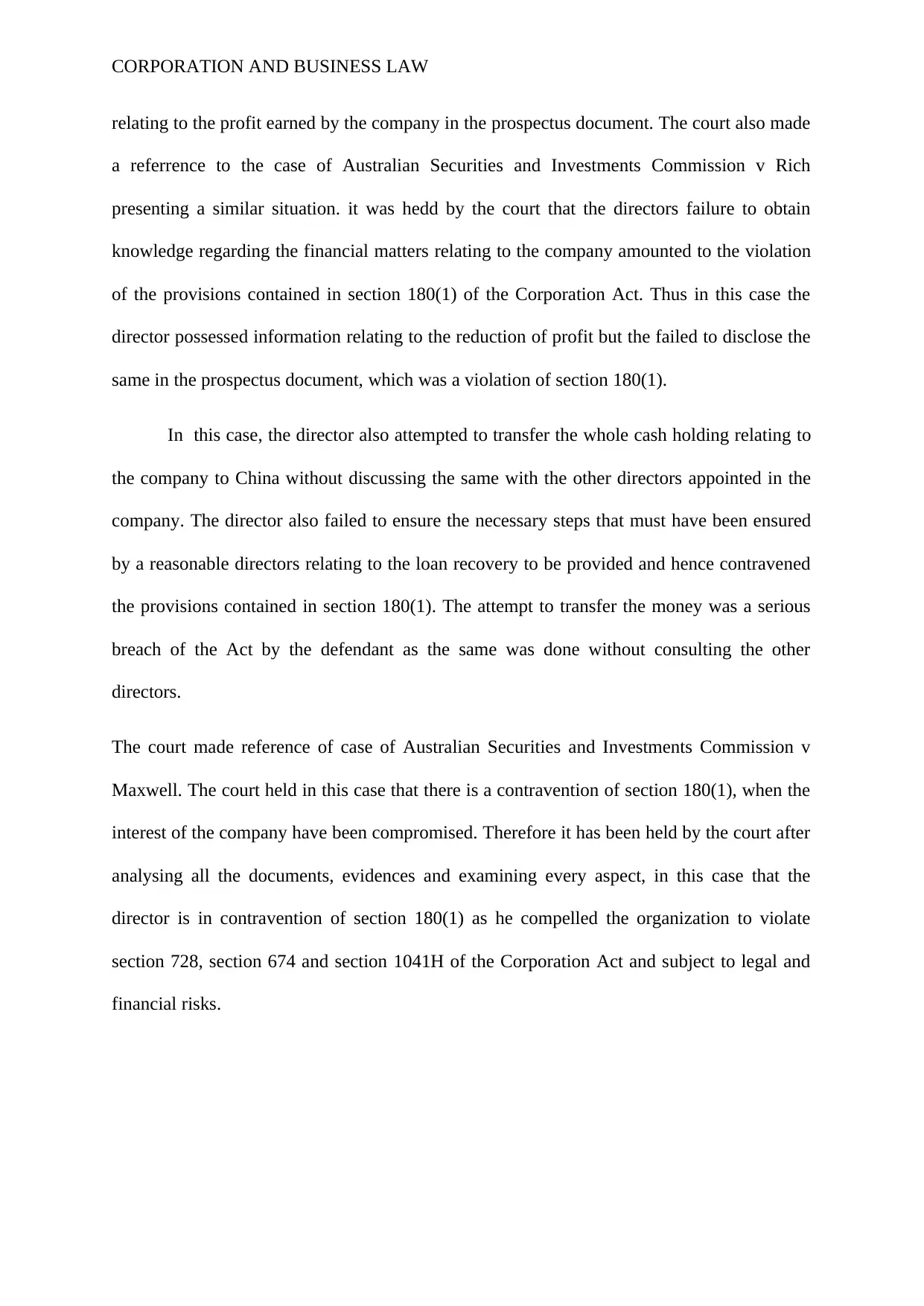
CORPORATION AND BUSINESS LAW
relating to the profit earned by the company in the prospectus document. The court also made
a referrence to the case of Australian Securities and Investments Commission v Rich
presenting a similar situation. it was hedd by the court that the directors failure to obtain
knowledge regarding the financial matters relating to the company amounted to the violation
of the provisions contained in section 180(1) of the Corporation Act. Thus in this case the
director possessed information relating to the reduction of profit but the failed to disclose the
same in the prospectus document, which was a violation of section 180(1).
In this case, the director also attempted to transfer the whole cash holding relating to
the company to China without discussing the same with the other directors appointed in the
company. The director also failed to ensure the necessary steps that must have been ensured
by a reasonable directors relating to the loan recovery to be provided and hence contravened
the provisions contained in section 180(1). The attempt to transfer the money was a serious
breach of the Act by the defendant as the same was done without consulting the other
directors.
The court made reference of case of Australian Securities and Investments Commission v
Maxwell. The court held in this case that there is a contravention of section 180(1), when the
interest of the company have been compromised. Therefore it has been held by the court after
analysing all the documents, evidences and examining every aspect, in this case that the
director is in contravention of section 180(1) as he compelled the organization to violate
section 728, section 674 and section 1041H of the Corporation Act and subject to legal and
financial risks.
relating to the profit earned by the company in the prospectus document. The court also made
a referrence to the case of Australian Securities and Investments Commission v Rich
presenting a similar situation. it was hedd by the court that the directors failure to obtain
knowledge regarding the financial matters relating to the company amounted to the violation
of the provisions contained in section 180(1) of the Corporation Act. Thus in this case the
director possessed information relating to the reduction of profit but the failed to disclose the
same in the prospectus document, which was a violation of section 180(1).
In this case, the director also attempted to transfer the whole cash holding relating to
the company to China without discussing the same with the other directors appointed in the
company. The director also failed to ensure the necessary steps that must have been ensured
by a reasonable directors relating to the loan recovery to be provided and hence contravened
the provisions contained in section 180(1). The attempt to transfer the money was a serious
breach of the Act by the defendant as the same was done without consulting the other
directors.
The court made reference of case of Australian Securities and Investments Commission v
Maxwell. The court held in this case that there is a contravention of section 180(1), when the
interest of the company have been compromised. Therefore it has been held by the court after
analysing all the documents, evidences and examining every aspect, in this case that the
director is in contravention of section 180(1) as he compelled the organization to violate
section 728, section 674 and section 1041H of the Corporation Act and subject to legal and
financial risks.
Paraphrase This Document
Need a fresh take? Get an instant paraphrase of this document with our AI Paraphraser
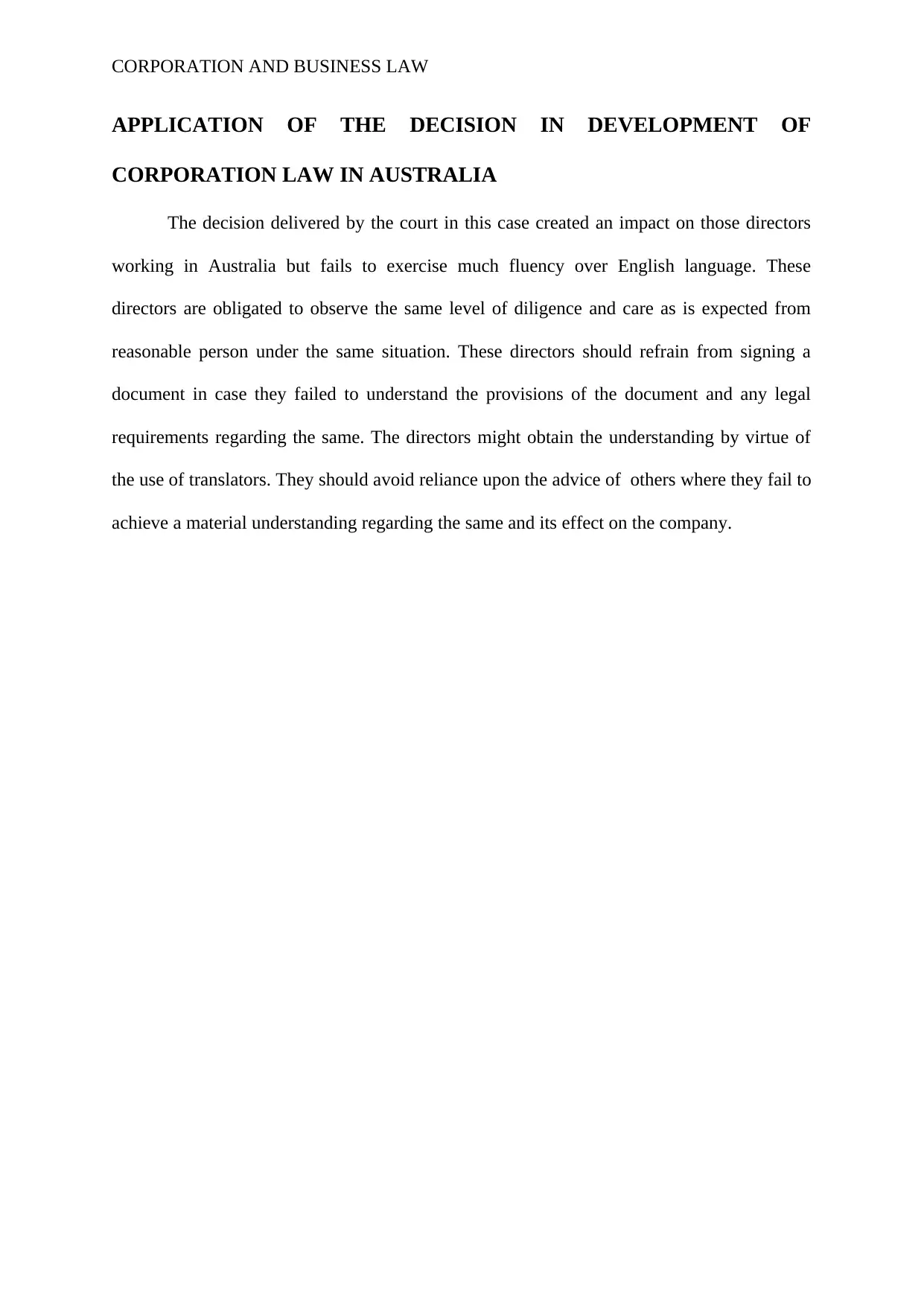
CORPORATION AND BUSINESS LAW
APPLICATION OF THE DECISION IN DEVELOPMENT OF
CORPORATION LAW IN AUSTRALIA
The decision delivered by the court in this case created an impact on those directors
working in Australia but fails to exercise much fluency over English language. These
directors are obligated to observe the same level of diligence and care as is expected from
reasonable person under the same situation. These directors should refrain from signing a
document in case they failed to understand the provisions of the document and any legal
requirements regarding the same. The directors might obtain the understanding by virtue of
the use of translators. They should avoid reliance upon the advice of others where they fail to
achieve a material understanding regarding the same and its effect on the company.
APPLICATION OF THE DECISION IN DEVELOPMENT OF
CORPORATION LAW IN AUSTRALIA
The decision delivered by the court in this case created an impact on those directors
working in Australia but fails to exercise much fluency over English language. These
directors are obligated to observe the same level of diligence and care as is expected from
reasonable person under the same situation. These directors should refrain from signing a
document in case they failed to understand the provisions of the document and any legal
requirements regarding the same. The directors might obtain the understanding by virtue of
the use of translators. They should avoid reliance upon the advice of others where they fail to
achieve a material understanding regarding the same and its effect on the company.
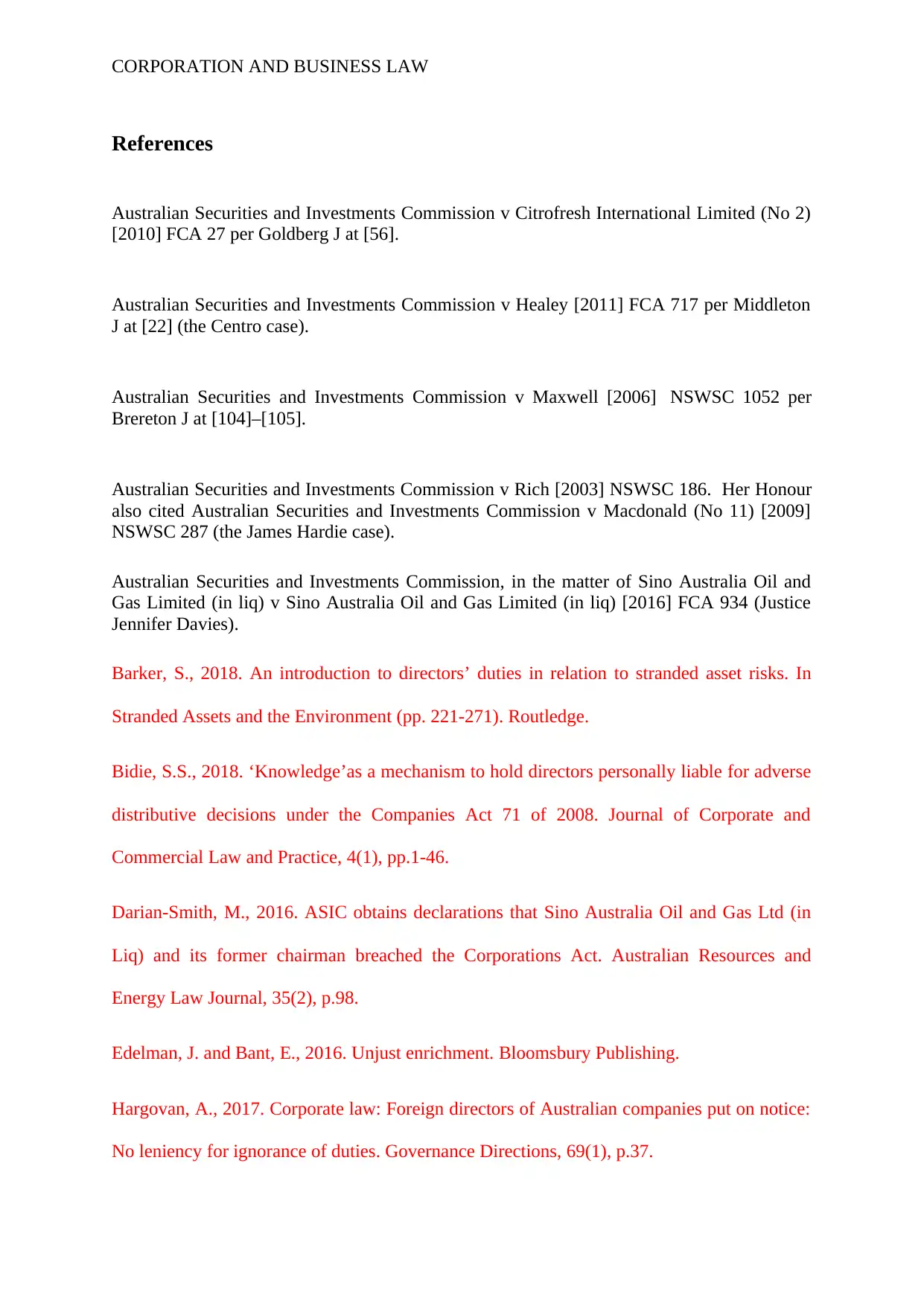
CORPORATION AND BUSINESS LAW
References
Australian Securities and Investments Commission v Citrofresh International Limited (No 2)
[2010] FCA 27 per Goldberg J at [56].
Australian Securities and Investments Commission v Healey [2011] FCA 717 per Middleton
J at [22] (the Centro case).
Australian Securities and Investments Commission v Maxwell [2006] NSWSC 1052 per
Brereton J at [104]–[105].
Australian Securities and Investments Commission v Rich [2003] NSWSC 186. Her Honour
also cited Australian Securities and Investments Commission v Macdonald (No 11) [2009]
NSWSC 287 (the James Hardie case).
Australian Securities and Investments Commission, in the matter of Sino Australia Oil and
Gas Limited (in liq) v Sino Australia Oil and Gas Limited (in liq) [2016] FCA 934 (Justice
Jennifer Davies).
Barker, S., 2018. An introduction to directors’ duties in relation to stranded asset risks. In
Stranded Assets and the Environment (pp. 221-271). Routledge.
Bidie, S.S., 2018. ‘Knowledge’as a mechanism to hold directors personally liable for adverse
distributive decisions under the Companies Act 71 of 2008. Journal of Corporate and
Commercial Law and Practice, 4(1), pp.1-46.
Darian-Smith, M., 2016. ASIC obtains declarations that Sino Australia Oil and Gas Ltd (in
Liq) and its former chairman breached the Corporations Act. Australian Resources and
Energy Law Journal, 35(2), p.98.
Edelman, J. and Bant, E., 2016. Unjust enrichment. Bloomsbury Publishing.
Hargovan, A., 2017. Corporate law: Foreign directors of Australian companies put on notice:
No leniency for ignorance of duties. Governance Directions, 69(1), p.37.
References
Australian Securities and Investments Commission v Citrofresh International Limited (No 2)
[2010] FCA 27 per Goldberg J at [56].
Australian Securities and Investments Commission v Healey [2011] FCA 717 per Middleton
J at [22] (the Centro case).
Australian Securities and Investments Commission v Maxwell [2006] NSWSC 1052 per
Brereton J at [104]–[105].
Australian Securities and Investments Commission v Rich [2003] NSWSC 186. Her Honour
also cited Australian Securities and Investments Commission v Macdonald (No 11) [2009]
NSWSC 287 (the James Hardie case).
Australian Securities and Investments Commission, in the matter of Sino Australia Oil and
Gas Limited (in liq) v Sino Australia Oil and Gas Limited (in liq) [2016] FCA 934 (Justice
Jennifer Davies).
Barker, S., 2018. An introduction to directors’ duties in relation to stranded asset risks. In
Stranded Assets and the Environment (pp. 221-271). Routledge.
Bidie, S.S., 2018. ‘Knowledge’as a mechanism to hold directors personally liable for adverse
distributive decisions under the Companies Act 71 of 2008. Journal of Corporate and
Commercial Law and Practice, 4(1), pp.1-46.
Darian-Smith, M., 2016. ASIC obtains declarations that Sino Australia Oil and Gas Ltd (in
Liq) and its former chairman breached the Corporations Act. Australian Resources and
Energy Law Journal, 35(2), p.98.
Edelman, J. and Bant, E., 2016. Unjust enrichment. Bloomsbury Publishing.
Hargovan, A., 2017. Corporate law: Foreign directors of Australian companies put on notice:
No leniency for ignorance of duties. Governance Directions, 69(1), p.37.
⊘ This is a preview!⊘
Do you want full access?
Subscribe today to unlock all pages.

Trusted by 1+ million students worldwide
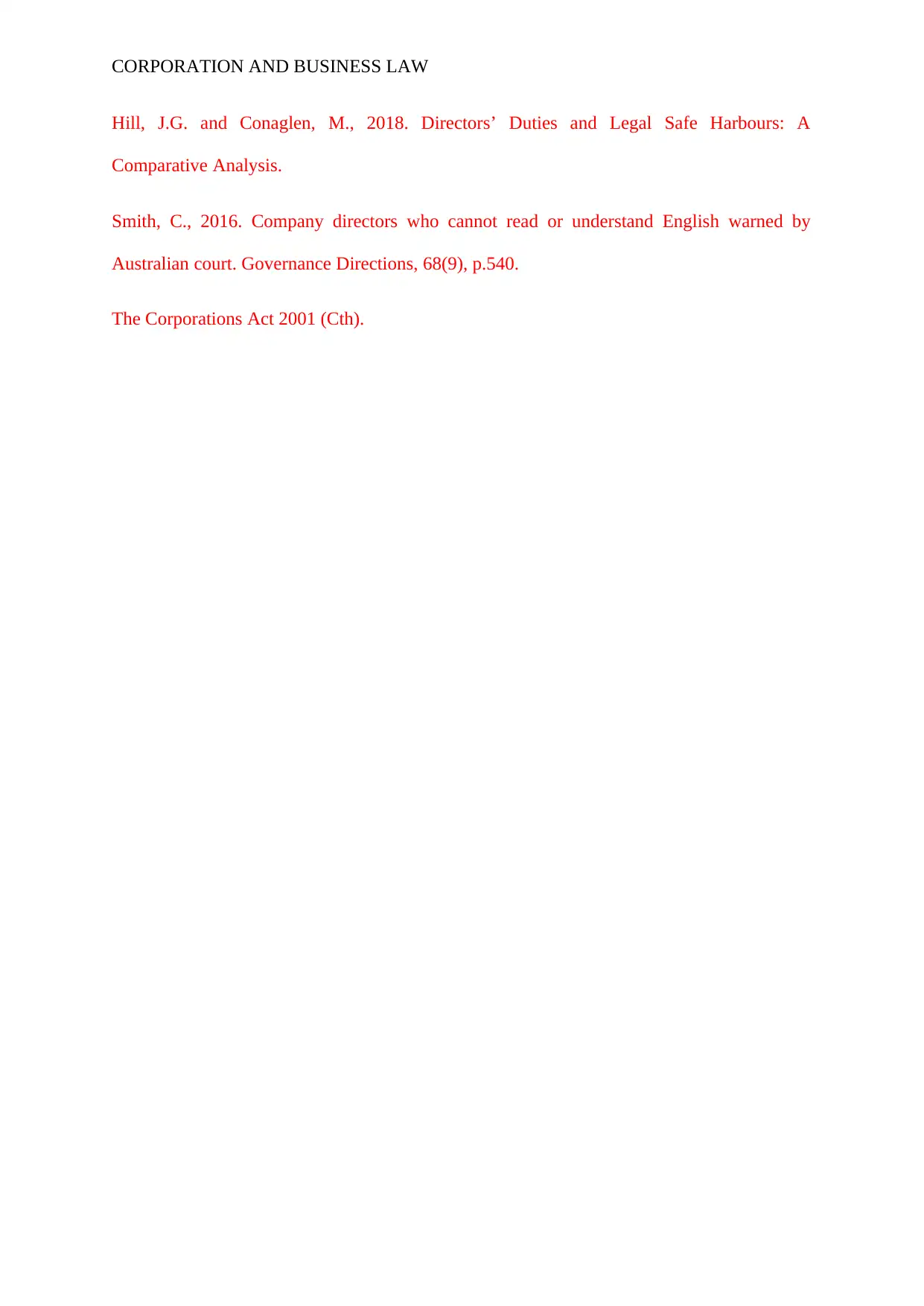
CORPORATION AND BUSINESS LAW
Hill, J.G. and Conaglen, M., 2018. Directors’ Duties and Legal Safe Harbours: A
Comparative Analysis.
Smith, C., 2016. Company directors who cannot read or understand English warned by
Australian court. Governance Directions, 68(9), p.540.
The Corporations Act 2001 (Cth).
Hill, J.G. and Conaglen, M., 2018. Directors’ Duties and Legal Safe Harbours: A
Comparative Analysis.
Smith, C., 2016. Company directors who cannot read or understand English warned by
Australian court. Governance Directions, 68(9), p.540.
The Corporations Act 2001 (Cth).
1 out of 10
Related Documents
Your All-in-One AI-Powered Toolkit for Academic Success.
+13062052269
info@desklib.com
Available 24*7 on WhatsApp / Email
![[object Object]](/_next/static/media/star-bottom.7253800d.svg)
Unlock your academic potential
Copyright © 2020–2026 A2Z Services. All Rights Reserved. Developed and managed by ZUCOL.





